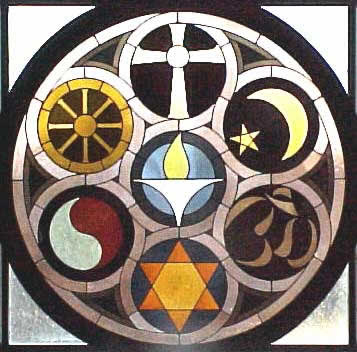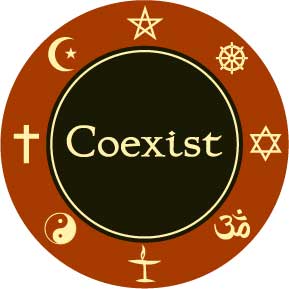Taufiq Rahim has an article in the Huffington Post.
He says, “As President Obama looks to foster a new dialogue with the Muslim world, I want to give voice to an Islam that is too often ignored in the media in both East and West.”
This is my reply as someone who shares Taufiq’s hopes.
Dear Taufiq
Thanks for your fine article.
I too, as a religious humanist, am inspired by the gifts of Islam. Who can fail to be moved by Rumi, Ibn-Al Arabi, the exquisite nature of the Alhambra, not to mention all of the science that is the foundation of Western ‘civilization’.
Every day I am the beneficiary of His Holiness Muhammad’s, Revelation, peace be upon Him, and the intellectual and spiritual truths discovered by those numberless great women and men who turned to Him.
But you skate over some very inconvenient truths.
I want to encourage you – and those who sincerely think like you – to try to get the ‘moderate majority’ in Islam to stand up and eliminate the hate-filled extremists who perpetrate such atrocities as 9/11.
Even one suspects that now hundreds or thousands are working towards the next 9/11 or much, much, worse. They are poisoned in their minds and paid for by Moslems in your part of the world – Wahabism or whatever. Only for as long as the security agencies are cleverer will the planned-for atrocities not occur. It is generally agreed that it is a matter not of if but when. (I know there is correspondingly much to be done to change the behaviour of Israel and the US.)
The extremists say they are your fellow believers. There’s the problem for non-Moslems. Is there a moderate majority? If there is why don’t they take control? Do all ordinary Moslems think the same as the extremists – and are simply less active? I know the difference between my friend who is a Quaker or my ex-neighbours who were Catholics and the crazies in the fundamentalist Christian pile. But I don’t know if there is truly a moderate majority in Islam.
I know the faith of sweet, ordinary people – of all faiths – is to be respected. I hear and believe what you say about those in;
the mountains of Tajikistan, the streets of Kabul, the alleyways of Damascus, the villages of South Lebanon, the madrasas of Uzbekistan, the towns of the West Bank, and even in corners of Riyadh.
But given what is happening in the name of Islam are they not victims just as much as the 3,000 who died in 9/11? Is such action not an insult to their faith? Are not more Moslems killed by fellow believers day after day after day? The only currency held in common seems to be hatred, all-consuming hatred. Lighten up. En-light-en up. It would be a relief if the extremists just loved other Moslems – the same of course is true of all fundamentalists.
I share with you the desire that the fruits of Islam be recognized world-wide and the pure faith of ordinary Moslems be honoured and respected as an example to us all. I shrink from the vile hatred so many other ‘believers in the Book’ heap upon Islam.
You say;
My Islam is foremost about reason. It is about harnessing one’s capacity to understand the complexities of this world and beyond. The mind and the pursuit of knowledge are central to comprehending, to the extent that is possible, what is the divine. One also cannot make conscious decisions about right or wrong without exercising his own judgment. Blindly following the edicts of scholars, is not choosing a path except one that is not your own. When I refrain from consuming alcohol, it is not because I am backward, or uncultured. I refuse drugs because they hinder our judgment and our ability to reason, the trait that God endowed us with that distinguishes humankind from all other beings.
Bravo – no religion has given more to the modern world than the massively enhanced re-presentation of the Ancient World’s knowledge. I know that whilst Europe was literally and metaphorically in the Dark Ages parts of the Islamic world had street lighting and the first university – al hamdulillah!
You say your Islam is about the equality of women, tolerance, compassion, humility. I know all you say about these is true of the real Islam – but will the real Islam please stand up!
Equality of women, tolerance, compassion, humility? – tell that to the 74 year-old widow Khamisa Sawadi, convicted and sentenced recently to 40 lashes for meeting with her late husband’s nephew i.e. he brought her shopping! Is this the Saudi version of ‘meals on wheels’ for the elderly?
In actuality, globally, Dear Taufiq your version of Islam is a fantasy. Your version would be called, by those who dominate Islam, a Western-corrupted perversion. Wahabism rules – you don’t! That’s the world’s plight. You are a) just a minority b) part of a group unwilling or unable to become the dominant majority.Transformation lies in the activation of Islam as a 21stC religion.
It’s not about numbers its about which version of Islam dominates globally – and yours doesn’t because as yet the moderate majority, if they exist, are not willing to say, “Enough, no more!”
No one else is going to restore Islam to its rightful place other than moderate Moslems. Not even the sweet charm of Obama, let alone the insane machinations of Bush’s crowd.
The world, including most of the Islamic world, was held in sympathy for a short time because of 9/11. Had America then raised 3,000 scholars of Islam instead of 3,000 cruise missiles, the world could soon have been at peace.
The possibility is still there – but only if moderate, modernized Islam moves to the dominant position.
What are you, and those moderate millions you refer to, going to do to ensure the good guys win? We Kafirs will not be the ones to bring about the change from 8thC Islam to 21stC Islam.
As I write it seems as if Iran – and the rest of the world – is doomed to more craziness.
At least the US has made an effort in electing Obama.
Roger
To read Taufiq’s fine article go to http://www.huffingtonpost.com/taufiq-rahim/what-is-my-islam_b_214432.html
mgc
Posted via web from sunwalking’s posterous


![Reblog this post [with Zemanta]](https://i0.wp.com/img.zemanta.com/reblog_e.png)








